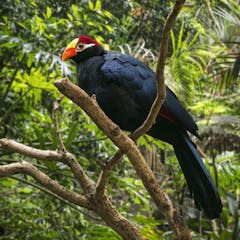
Articles on Poaching
Displaying 1 - 20 of 90 articles

Pangolins are among the most trafficked and poached mammals in the world.

What would you do with 2,000 farmed rhinos? An African charity wants them to help their wild cousins.

To what extent should the costs of protecting globally valued rhinos be carried by their local custodians?

The findings suggest that poaching rates are lower where there is strong national governance and levels of local human development are higher.

Pastoral communities should be included in conservation initiatives – but the ecology of pastoral lands has long been misunderstood.

A study of tweets posted in 2019 found that tweets about elephant conservation didn’t align with the actual greatest threats to the animals, creating the risk that funding could be misdirected.

Money pouring into conservation has funded drones and military-style training for rangers.

Legal hunting helps rhino conservation for biological and socio-economic reasons.

This was the first national DNA-based assessment of any free-ranging large mammal in Africa.

A new study reveals the major players and routes involved.

There is a promising trend of growing research and training in statistical ecology in Africa.

We analysed the legal systems regulating the wildlife trade in China. Here’s what we found.

Elephants avoided areas where others were poached.

Helicoptering heavy herbivores across Africa is no laughing matter.

Nigeria must improve biodiversity awareness among its citizens to stem animal poaching and halt biodiversity loss.

Most South African provinces are favourable for the establishment of a new invasive alien pest, which may lead to the extinction of native cycad species.

A new review of the status of African elephants finds scientific grounds for dividing them into two species, and reports that both have suffered drastic population declines since 1990.

Elephants use their giant incisors to dig holes, impress rivals and rest weary trunks. But as so many continue to be killed for their ivory, he question is whether they are destined to be tuskless.

Global conservation efforts have suffered during the COVID-19 outbreak. It’s sadly ironic, because avoiding habitat loss is a cost-effective way to prevent pandemics.

Forest rangers were subjected to occupational violence by their employers. This in turn can provoke a violent reaction to illegal activities, resulting in violent policing tendencies.
